November 1, 2019 · MARK REDWINE
This blog is part of a series exploring ministry and need at the U.S./Mexico border. It has been adapted for length from its original publication in Kings River Life Magazine in April of 2019. This account reflects the situation on the Brownsville border at the time of publication. To read the original, click HERE.
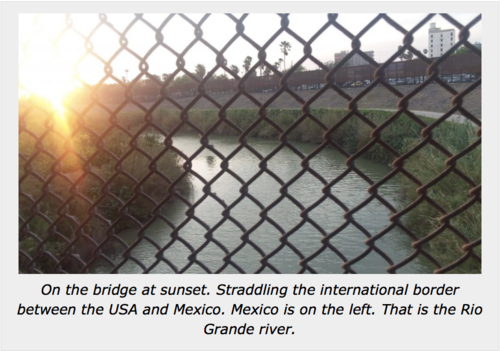
I first met Cami from Cameroon in December of 2018. She was living in a makeshift shelter on the Mexican side of the Gateway Bridge, which connects Brownsville, Texas with Matamoros, Mexico. There were about 30 other people from all over the world staying in the shelter. Some people came with families, some women were pregnant, some had babies—tiny babies, sick babies. Some people were single, some were married, all were cold and hungry, and all needed fresh clothing. Some had walked over a thousand miles to reach this place. The babies needed diapers, wipes, and formula. Some people only had flip-flops for foot gear, and no socks. There was no access to water at the camp, and dampness permeated everything. The wind felt like sharp needles piercing your skin. There was no place to hide from the cold.
Until the first of December, they camped on the sidewalk on the bridge, as close as they could to the American guards who would not let them pass into the U.S. to seek asylum. They lived with the hope that a guard would call them over and allow them to enter America. Two years ago, a person could just walk across the bridge and ask for asylum. Now, they are all stopped at the center of the bridge and turned away.
Mexican authorities removed the asylum seekers from the bridge in early December, so Cami and the others set up a shelter at its base. The Mexican guards now control who passes into the U.S., working with the American side to send only a specific number of people each day, a practice called metering. The Mexican side picks the lucky few and brings them to the center of the bridge, where they are handed over to the U.S. guards. This system has led to a log jam of people. An asylum seeker is given a number, but the numbers don’t really mean much; the system is corrupt, and the guards call who they want. Sexual favors and money can get you into the U.S. ahead of others who have been waiting much longer.
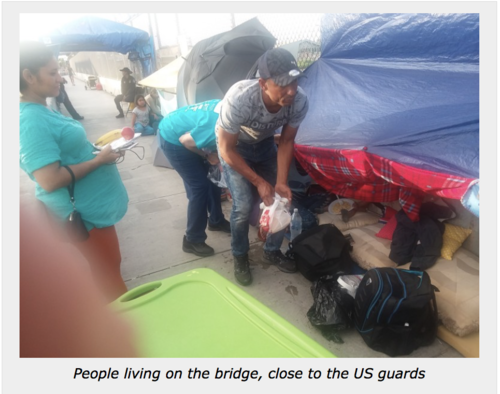
The Mexican authorities tore down the unofficial shelter in February of this year and chased everyone away, meaning the hundreds of people seeking asylum had to find somewhere else to live. About 114 people live in a plaza, or on the banks of the Rio Grande River, as close to America as they can be. But they have no shelter. There are 180 more people living on the other bridge in town. There are about 200 others who are supposed to be living in shelters in Matamoros, but the shelters can’t handle that many people. If the weather gets too bad, the Mexican Red Cross will come and pick people up—especially women and children—and take them to the shelters and some of the churches in town for one night.
Many people won’t go to the shelters out of fear of losing their place in line, though. Sometimes, even the churches hosting them don’t have the ability to keep them safe—people who are vulnerable become easy prey for the cartels. So they sleep outside in the rain on the cold hard ground or on metal park benches, waiting to be called. This is part of the humanitarian crisis happening on the border.
There are people who have a heart for helping those who are suffering. Not all of these helpers are necessarily following the scriptural mandate to love others; they are just good people with hearts of compassion. I am blessed to work such a bunch of volunteers in Brownsville. They minister compassion in a physical way to asylum seekers across the bridge and to asylum seekers who have been released by Immigration and Customs Enforcement (ICE) in the U.S.
I first met Cami when I was helping this group bring hot meals to the people living in her camp. She was very discouraged about not being chosen to cross into the U.S. I asked her if she was a Christian and if I could pray for her. She said yes to both. I brought her a Bible the next time I crossed into Mexico. Often, I take my ukulele across and play Spanish praise and worship songs with the people in the camp and pray for them. Cami calls me her pastor.
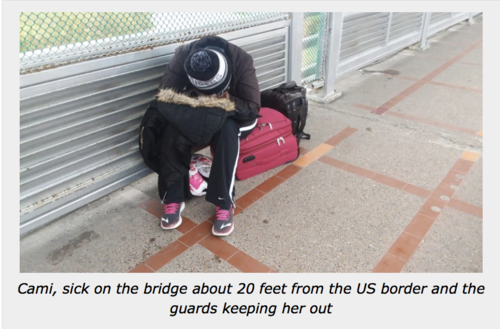
Cami is 33 years old. She has a husband and three children left behind in Cameroon, one of whom was still nursing when she fled. Had she stayed there, she would have been raped, beaten, and killed by the soldiers. If she is denied asylum and sent back, that is what awaits her.
Cami was a teacher. She told us there is an incredible amount of corruption and fraud among teachers and a lot of discrimination against English-speaking Cameroonians, especially teachers. When she went to school for her certification, the teacher would give her a zero if she wrote her papers in English, not bothering to translate them. Right now, English-speaking, educated people are being killed in Cameroon, as are those who help them. This is what she fled.
Just before leaving, Cami went to a protest where she was arrested, beaten, and raped along with all the other female protestors. She and her husband made the decision for her to leave Cameroon; they knew that the authorities would come back for her after she was released. She left so quickly that she could not say good bye to her children.
I was able to speak with her husband, and found out that all of the people who protested with Cami were killed. He said that there are many funerals in Cameroon without bodies. People are hauled off by the police or military and never seen again—they just vanish. He said he would wait one year to hear from Cami. If he did not hear from her, the family would have a funeral for her. He said that when the shooting starts in his town, he takes the kids and they hide in the bush until it is over, sometimes for days. When I first talked with him, he thought I was someone from the Cameroonian government trying to trap him, but I slowly won his trust.
Cami traveled from Camaroon to Cambodia and then to South Korea, where she was kept in a cold room with a hard floor and treated very badly. She wanted to go to Canada but didn’t have the visa, so she went to Mexico, where she was beaten again. Then, she made it to Matamoros, to the camp at the base of the bridge where I first met her.
After nine weeks of waiting, Cami started getting sick and depressed to the point of not being able to get up in the morning. She was not eating. She also has a tropical disease that flares up when her immune system weakens, when she gets tired, and when she is under a lot of stress. This disease could kill her if not treated, and I was worried about her. She had come so far and been through too much to reach the U.S. border to just give up now. At that time, she could barely walk.
There were two other Africans waiting in the camp; Cami called them her brothers. Though they were not related through DNA, they treated her like a sister and protected her like a sister. Her disease was causing screaming pain along her spine and in her arms, and her African brothers were trying to help her the best they could.
The guards started to notice Cami. They didn’t want anyone to die on their watch, so they said she could pass the next day at 6:30 a.m. That morning, a member of our team met Cami and helped her reach the guard station on the bridge. They were told there was no room in the detention facilities, so they could not let her in after all. No one would pass that day. Devestated, Cami was walked back to camp and melted into her sleeping bag. We received word from the Mexican guards that she could pass the next day at 6:30 a.m. I came to help her to the guard station the next morning.
The guards change shifts every hour, and there is no consistency of communication between shifts. At every guard change, I had to tell the same story. Finally, one of the guards called the shift supervisor and allowed me to speak with her. That supervisor had no communication from her supervisor to allow Cami to cross. About that time, her African brothers came looking for her. They were very surprised to see me still with her. They returned to camp, and I helped Cami back so we could put her back to bed. Then, we again had word from the Mexican guards the she could pass the next morning.
For the third time, her brothers carried her to the check point at 6:00 a.m. and waited with her there. They didn’t know if this time would be different, or if once again they would be sent back.
To be continued…Keep an eye out for the second installment of Cami’s story on our blog.
Mark and Marilyn Redwine are voluntary Nazarene missionaries in Brownsville, Texas which is right on the border with Mexico. They have been ministering the love of Jesus to the people there for the last nine years. They have two ministries, both of which are to the most marginalized. One is to the people living in generational poverty, and the other is to asylum seekers. Learn more about their ministry on their Facebook page.

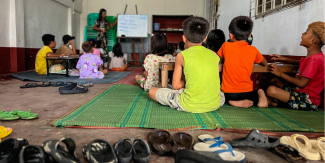
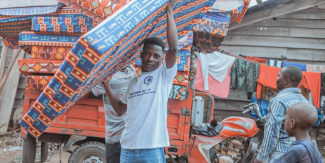
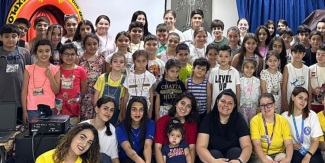

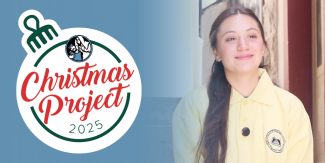
Add new comment